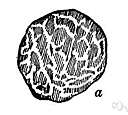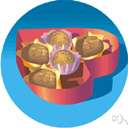| Noun | 1. |  truffle - any of various highly prized edible subterranean fungi of the genus Tuber; grow naturally in southwestern Europe truffle - any of various highly prized edible subterranean fungi of the genus Tuber; grow naturally in southwestern Europe
genus Tuber, Tuber - type genus of the Tuberaceae: fungi whose fruiting bodies are typically truffles
fungus - an organism of the kingdom Fungi lacking chlorophyll and feeding on organic matter; ranging from unicellular or multicellular organisms to spore-bearing syncytia
|
| 2. |  truffle - edible subterranean fungus of the genus Tuber truffle - edible subterranean fungus of the genus Tuber
|
|
| 3. |  truffle - creamy chocolate candy truffle - creamy chocolate candy
|
TRUFFLE SEASON [SEPTEMBER ~ DECEMBER]
TRUFFLE OIL
AUSTRALIAN TRUFFLES
Web definitions for placebo |
|
| an innocuous or inert medication; given as a pacifier or to the control group in experiments on the efficacy of a drug wordnetweb.princeton.edu/perl/webwn - Definition in context |
|
Search Results
Saturday: 25 SEPTEMBER 2010
Straits Times
review section - DAEDALUS
by ANDY HO [Senior Writer]
POPPING GLUCOSAMINE AS PLACEBO
Overall, older glucosamine studies tend to be more positive, perhaps
because of publication bias by industry-funded or industry-affiliated authors. More recent studies tend to be less positive, perhaps because most journals now require the public registration of any clinical trial before it ever commences.
Learning is for all,
regardless of age..
or previous 'wisdom' .. 
Forget What You Know About Study Habits
Cramming the brain like a suitcase does nothing for learning.
Psychologists have discovered that some of the most hallowed advice on study habits is wrong.
Clear a quiet work space. Stick to a homework schedule. Set goals.
Set boundaries. Do not bribe — the findings directly contradict much of this common wisdom.
In fact, a few simple techniques can reliably improve how much a student learns from studying.
For instance, instead of sticking to one study location, simply alternating the room where a person studies improves retention. So does studying distinct but related skills or concepts in one sitting, rather than focusing intensely on a single thing.
“We have known these principles for some time, and it’s intriguing that schools don’t pick them up, or that people don’t learn them by trial and error,” said Robert A. Bjork, a psychologist at the University of California, Los Angeles.
Take the notion that children have specific learning styles, that some are “visual learners” and others are auditory; some are “left-brain” students, others “right-brain.” In a recent review in the journal Psychological Science in the Public Interest, a team of psychologists found almost zero support for such ideas. “The contrast between the enormous popularity of the learning-styles approach within education and the lack of credible evidence for its utility is, in our opinion, striking and disturbing,” they concluded.
Many study skills courses insist that students find a specific place, a study room or a quiet corner of the library, to work.
The research finds just the opposite.
The brain makes subtle associations between what it is studying and the background sensations it has at the time, the authors say. It colors the terms of the Versailles Treaty with the fluorescent glow of the dorm study room, say; or the elements of the Marshall Plan with the jade-curtain shade of the willow tree in the backyard.
“What we think is happening here is that, when the outside context is varied, the information is enriched, and this slows down forgetting,” said Dr. Bjork.
Likewise, varying the type of material studied in a single sitting seems to leave a deeper impression on the brain than does concentrating on just one skill at a time.
Research also undermines the intensive immersion approach.
Hurriedly jam-packing a brain is akin to speed-packing a cheap suitcase: it holds its new load for a while, then everything falls out.
When the neural suitcase is packed carefully and gradually, it holds its contents for far, far longer. An hour of study tonight, an hour on the weekend, another session a week from now: such so-called spacing improves later recall.
No one knows why.
It may be that the brain, when it revisits material at a later time, has to relearn some of what it has absorbed before adding new stuff — and that that process is itself self-reinforcing.
“The idea is that forgetting is the friend of learning,” said Nate Kornell, a psychologist at Williams College in Massachusetts and an author of a study on learning.
“When you forget something, it allows you to relearn, and do so effectively, the next time you see it.”
By BENEDICT CAREY

GENTING TRIO
hOt & spIcy


How to decrease the burning sensation

SANDSATION WEEK *GENTING TRIO*
| HOLDING BELIEF |
|

sIngapOre F1 nIght cIrcUIt
fUll mOOn faIry
fUll mOOn magnetIc fOrce tOO pOwer thIs eVenIng [Wednesday: 22 SEPTEMBER 2010]
